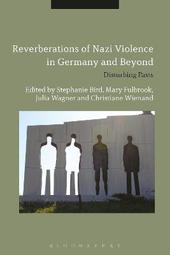
|
Reverberations of Nazi Violence in Germany and Beyond: Disturbing Pasts
Paperback / softback
Main Details
| Title |
Reverberations of Nazi Violence in Germany and Beyond: Disturbing Pasts
|
| Authors and Contributors |
Edited by Dr Stephanie Bird
|
|
Edited by Professor Mary Fulbrook
|
|
Edited by Dr Julia Wagner
|
|
Edited by Dr Christiane Wienand
|
| Physical Properties |
| Format:Paperback / softback | | Pages:312 |
|
| ISBN/Barcode |
9781350045644
|
| Classifications | Dewey:940.5405 |
|---|
| Audience | | Postgraduate, Research & Scholarly | |
|---|
|
Publishing Details |
| Publisher |
Bloomsbury Publishing PLC
|
| Imprint |
Bloomsbury Academic
|
| Publication Date |
24 August 2017 |
| Publication Country |
United Kingdom
|
Description
Reverberations of Nazi Violence in Germany and Beyond explores the complex and diverse reverberations of the Second World War after 1945. It focuses on the legacies that National Socialist violence and genocide perpetrated in Europe continue to have in German-speaking countries and communities, as well as among those directly affected by occupation, terror and mass murder. Furthermore it explores how those legacies are in turn shaped by the present. The volume also considers conflicting, unexpected and often dissonant interpretations and representations of these events, made by those who were the witnesses, victims and perpetrators at the time and also by different communities in the generations that followed. The contributions, from a range of disciplinary perspectives, enrich our understanding of the complexity of the ways in which a disturbing past continues to disrupt the present and how the past is in turn disturbed and instrumentalized by a later present.
Author Biography
Stephanie Bird is Senior Lecturer in German and Vice-Dean of the Faculty of Arts and Humanities at University College London, UK. She is the author of Women Writers and National Identity (2003) and Recasting Historical Women: Female Identity in German Biographical Fiction (1998). Mary Fulbrook is Professor of German History and Dean of the Faculty of Social and Historical Sciences at University College London, UK. She is the author or editor of more than 20 books including A Concise History of Germany (3rd edition, 2015) and A History of Germany 1918-2014: The Divided Nation (4th edition, 2014). Her most recent publications include Dissonant Lives: Generations and Violence through the German Dictatorships (2011) and the Fraenkel Prize winning A Small Town near Auschwitz: Ordinary Nazis and the Holocaust (2012). Julia Wagner is Research Associate in the Faculty of Arts and Humanities at University College London, UK. Christiane Wienand is Research Associate in the Faculty of Arts and Humanities at University College London, UK.
ReviewsThis is a fascinating collection of stimulating essays ... there is much to recommend the volume, including the interdisciplinary and transnational approaches the authors take in investigating the 'development of narratives, experiences and disturbances'. The volume also recommends itself by moving away from broad, amorphous collectives in the construction of memory and towards the individuals' roles in these processes in their concrete contexts. What emerges are subtle insights and ample food for thought. * European History Quarterly * The Second World War was a global, in particular European experience of extreme brutality, of violence both inflicted and endured. This book explores the many ways these experiences are still haunting individuals and communities and the ways they deal with their disturbing presence. There is a common knowledge provided by this powerful collection of articles from many disciplines of the humanities: that there is no mastering of the past, no healing. From our presence, the past will not go away, it will not die with those who lived through it, and even when it seems vanished it is waiting for us to be rediscovered and reproduced as painful, confusing or abused, but always disturbing. * Dorothee Wierling, Research Centre for Contemporary History in Hamburg, Germany * This is an engaged and engaging, fascinatingly wide-ranging intervention in the "memory boom": a collection of ethically and narratively aware essays that range across history, theory, and cultural production to challenge and explore past and present, self and memory as relational, shifting, and dynamic. It is bound to provoke and influence debate. * Sarah Colvin, University of Cambridge, UK * This multidisciplinary collection brings together an international group of historians, film critics, and literary scholars who examine the ways in which troubling echoes of the Nazi past have disturbed and disrupted what are now our past presents - often in unexpected ways. Focusing on emotional and artistic responses to the extreme violence of the 1940s, the case studies that make up this superb volume take a novel approach to the idea of "collective memory," showing how the reverberations of traumatic past events not only affect the present but are also shaped by the present. What is especially attractive is the way in which the authors collectively show how the same phenomena could affect different communities in vastly different ways. * Andrew Port, Wayne State University, USA * This is an excellent and timely volume that shows clearly how the memory of National Socialism continues to haunt Europe. Following recent developments in memory studies, it adopts a transnational approach, while not forgetting the importance of the national context. It is theoretically well informed, yet the contributions have a solid empirical basis and are lucidly written. The book will be of great benefit to students and scholars, and be of interest to the general reader. * William Niven, Nottingham Trent University, UK *
|